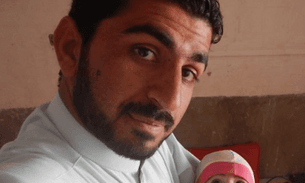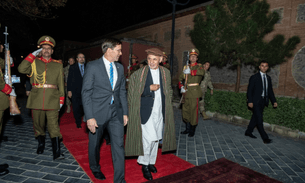
Bureau reporter meets 16-year-old three days before US drone kills him
Tariq Aziz (circled) at the Grand Jirga in Islamabad – Pratap Chatterjee
A week ago I joined a group of elders and dozens of other young men who had travelled from Waziristan, in northern Pakistan, to Islamabad to discuss the impact of US drone strikes in their communities.
Among the group was Tariq Aziz, a quiet 16-year-old, who had come after he received a phone call from a lawyer in Islamabad offering him an opportunity to learn basic photography to help document these strikes.
We met for a grand dinner in the conference hall of a luxury hotel. And the next day we all met again at an official meeting – a ‘Waziristan Grand Jirga’. I filmed Tariq Aziz as he walked in with his friends. Each of them pressed their right palms on the chest of each of the elders who lined up to meet them.
Tariq was proud to be part of this meeting. About 18 months earlier, in April 2010, his cousin Aswar Ullah was killed by a missile fired from a drone as he rode a motorcycle near Norak.
Tariq, like all of us, listened intently to the speakers, who included the politician and former cricketer Imran Khan.
What none of us could have imagined was that 72 hours later, this football-loving teenager would himself be killed by a CIA drone, along with his 12-year-old cousin Waheed Khan.
To watch the Bureau’s report on the ongoing Drone War click on the link below.
Children killed
Tariq and Waheed’s death brought the total number of children killed in drone strikes to 175, according to the Bureau’s own findings. As part of an ongoing investigation, the Bureau has documented 306 strikes from remotely piloted drones that have killed between 2,359 and 2,959 people. Over 85% of them have been launched by the administration of President Barack Obama.
Tariq came from a poor community on the border with Afghanistan. He was the youngest of seven children. His father, Mumtaz Khan, was away working in the United Arab Emirates as a driver to support his family. Waheed’s family was equally poor – the 12-year-old worked in a local shop for a salary of just Rs 2000 a month (roughly £15 or $23)
Last week on October 27, Tariq travelled to Islamabad, where he stayed at the Al Habib hotel, after agreeing to work with Shahzad Akbar, a lawyer who runs the Foundation for Fundamental Rights and is now working with families who have lost relatives to drone strikes.
He had agreed to be part of a project organised by Reprieve, a British legal charity, photographing the aftermath of drone strikes in Waziristan.
Jemima Khan, the former wife of Imran Khan, who was also at the gathering, has donated a dozen new cameras for use in this project.
Jemima Khan
During the Jirga, Tariq sat exactly two rows behind Jemima Khan. For four hours the Waziris debated the drone war, and then they listened to a resolution condemning the attacks. The group voted for this unanimously.
After lunch, the group travelled to a protest rally outside the Pakistani parliament. Imran Khan, who is now the leader of the Tehreek-e-Insaaf political party, and Clive Stafford Smith, the founder of Reprieve, addressed a gathering of some 2,000 people.
The next day, Tariq and the other Waziris returned to their homes, eight hours drive away.
On Monday, October 31, Tariq took his cousin Waheed Khan to pick up his newly wed aunt, to take her back to Norak. When the two boys were just 200 yards from the house, two missiles slammed into their car, killing them both instantly.
‘I don’t see the logic and reasoning in killing two young boys,’ Shahzad Akbar told the Bureau. ‘We wanted to work with the youth, to include them in the search for accountability.’
‘Bar has been raised’ on CIA drone tactics
The CIA has secretly agreed changes to how it conducts its drone war in Pakistan after pressure from the military and State Department, according to a report in the Wall Street Journal.
Last month, the Bureau reported the 300th strike of the CIA’s seven-year drone campaign, and Bureau reporter Chris Woods suggested in an analysis piece that the pattern of recent strikes suggests the CIA has changed tactics to focus on killing senior militants, or High Value Targets.
The Wall Street Journal’s report appears to confirm this.
The changes include the State Department having more influence in strike decisions, Pakistani leaders being told about strikes in advance more often, and the CIA holding off from strikes when Pakistani officials are visiting the US, the report says.
‘The bar has been raised. Inside CIA, there is a recognition you need to be damn sure it’s worth it,’ the Journal quotes a senior official saying.
The military and National Security Advisor Tom Donilon are increasingly critical of strikes targeting large groups, as they fear the Pakistani authorities may respond to such strikes by cutting off vital supply routes into Afghanistan.
Meanwhile, senior State Department officials have been critical of the strikes’ impact on diplomacy with Pakistan, when relations are already strained following the raid that killed Osama bin Laden in May.
The White House has instigated an appeals process, giving the State Department more influence in deciding when to strike, although the CIA director still makes the final decision, the Journal claims. There has been no fixed policy towards smaller strikes, or targeted attacks on High Value Targets.
Alice Ross
Akbar says that the CIA had every opportunity to meet with Tariq, if they wanted to, when he visited Islamabad. ‘If they were terrorists, why weren’t they arrested in Islamabad, interrogated, charged or tried?’
On Tuesday, Akbar spoke to Noor Kalam, Tariq’s uncle, who said he was devastated by the news. ‘We are helpless. We cannot do anything against the Americans,’ he told the lawyer. ‘We would like insaaf – justice.’
Mumtaz Khan, Tariq’s father, has flown back from the United Arab Emirates, to mourn the death of his son. He is now in discussions with Akbar to bring a lawsuit against the CIA. He will be the 31st family to sign up.
The video footage used in this story is NOT creative commons. To reuse or access the full footage please contact the Bureau at [email protected].


